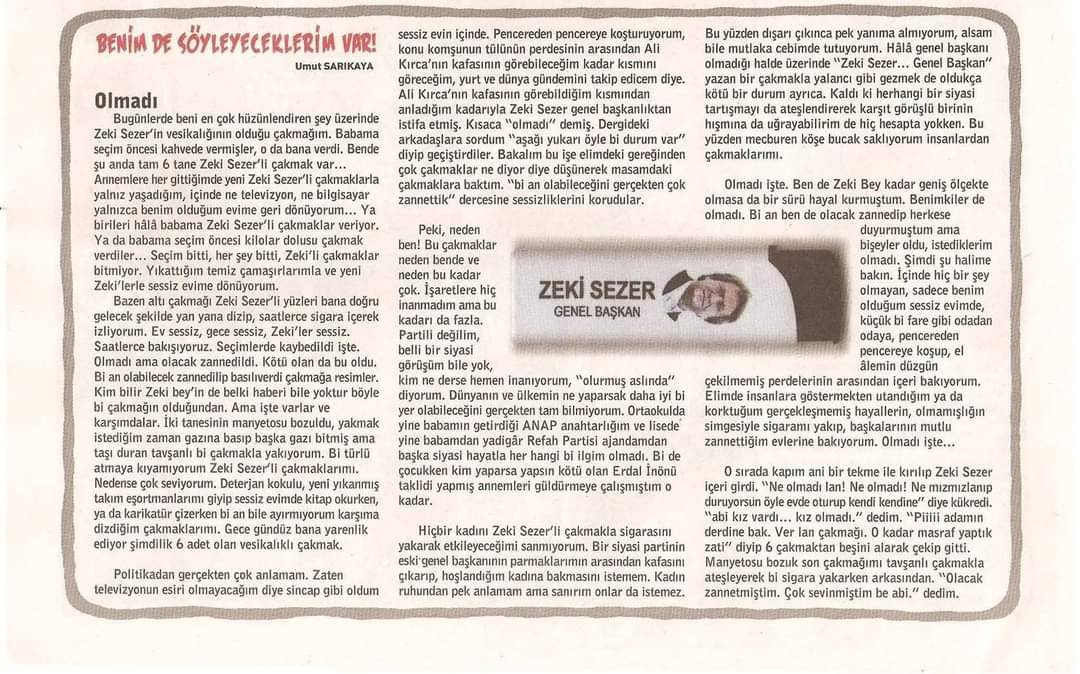Zeki Sezer çakmağı https://t.co/FAs9fkhjn9
BENIM DE SÖYLEYECEKLERİM VAR! Umut SARIKAYA Olmadı Bugünlerde beni en çok hüzünlendiren şey üzerinde Zeki Sezer'in vesikalığının olduğu çakmağım. Babama seçim öncesi kahvede vermişler, o da bana verdi. Bende şu anda tam 6 tane Zeki Sezer'li çakmak var… Annemlere her gittiğimde yeni Zeki Sezer'li çakmaklarla yalnız yaşadığım, içinde ne televizyon, ne bilgisayar yalnızca benim olduğum evime geri dönüyorum… Ya birileri hâlâ babama Zeki Sezer'li çakmaklar veriyor. Ya da babama seçim öncesi kilolar dolusu çakmak verdiler… Seçim bitti, her şey bitti, Zeki'li çakmaklar bitmiyor. Yıkattığım temiz çamaşırlarımla ve yeni Zeki'lerle sessiz evime dönüyorum. Bazen altı çakmağı Zeki Sezer'li yüzleri bana doğru gelecek şekilde yan yana dizip, saatlerce sigara içerek izliyorum. Ev sessiz, gece sessiz, Zeki'ler sessiz. Saatlerce bakışıyoruz. Seçimlerde kaybedildi işte. Olmadı ama olacak zannedildi. Kötü olan da bu oldu. Bi an olabilecek
The image is a newspaper article. It's a humorous piece about a man, Zeki Sezer, who appears to be a prominent political figure (perhaps a former mayor or similar). The article satirizes the seemingly endless supply of Zeki Sezer-branded lighters that the author keeps getting (and, by implication, the political figure's image and campaign activities). The joke, in Turkish, relies on several layers of absurdity: * **The endless supply of lighters:** The author repeatedly receives Zeki Sezer lighters, seemingly even after the politician has supposedly stepped down or is otherwise no longer relevant. This symbolizes how people might be fixated on certain personalities or political figures even when they are not actively engaging or succeeding in their roles. * **The "olmadı" theme:** The word "olmadı" (it didn't happen/didn't work) is repeated throughout the article. This highlights the futility of the situation and the author's frustration with the continued presence and image of Zeki Sezer, as well as his continued hope for an ideal outcome. * **The "çakmak" imagery:** Lighters are used as a symbol of the political figure. This symbolizes how people might be obsessed with trivial things or personalities instead of focusing on more important aspects of politics or life. * **The juxtaposition of personal experiences with political satire:** The author's personal experiences (receiving gifts of lighters, being emotionally affected by Zeki Sezer's image) are used to satirize the political figure's image and the repetitive nature of political discourse. In essence, the article uses humor to satirize the often-unrealistic expectations and obsessions some people have with political figures and the seemingly trivial nature of some political campaign strategies. The humor comes from the absurd contrast between the author's everyday frustrations and the political context.

Henüz bişi yazılmamış